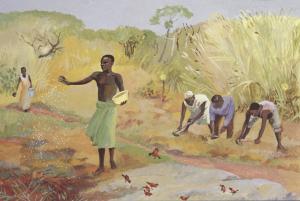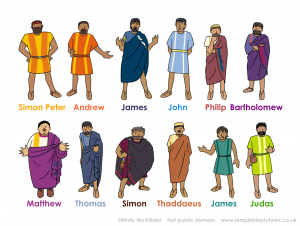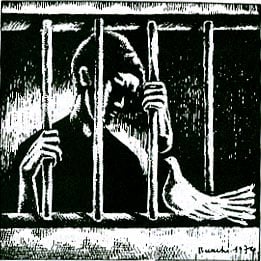
Jesus tells parables, stories with comfortably familiar scenes and, often, strange twists. The tendency of interpreters has been to find heavenly meaning in the earthy tones, but in Mark at least the meaning as well as the tone is quite earthly. Tenth in a series on “The Worldly Spirituality of Mark’s Gospel” with help from Ched Myers’ Binding the Strongman: A Political Reading of Mark’s Story of Jesus. The Introduction and a Table of Contents are HERE.
The scribes base their opposition to Jesus on a dualistic fiction. They are the good guys. Anyone who is against them is in league with the devil. It’s a common tactic by those who are in power to slander those who threaten them. They need a way to cast their opponents as “other,” not one of “us.” Dom Helder Camera, archbishop of Recife, Brazil, experienced it. When he helped the poor they called him a saint, but “when I asked why they are poor, they called me a Communist.”
Jesus has his own dualism to replace that of the scribes. There are those who do the will of God and those who don’t. In another place it’s those who are with me and those who are against me, or those inside and those outside. But Jesus’ new dualism does not really divide people. Though he has cast the scribes as agents of the devil, he will later literally call Peter Satan. (Mark 8:33) Jesus castigates enemies who “hear and listen but don’t understand.” But only a little later will rebuke his disciples during the storm at sea: “Why are you terrified? Do you not yet have faith?” (Mark 4:40)
Parables
At the moment Jesus is giving an extended sermon, including the Parable of the Sower and two more parables about seeds. All of this is spoken from a boat a little way offshore to a crowd on the shore.
Coming on the heels of conflicts with both scribal authorities and Jesus’ own family, it would be surprising if this teaching episode, even with no opponents present, were not a further elucidation of the conflict. Jesus speaks his challenge in parables.
In the Parable of the Sower, the majority of the seed is wasted. It falls on the path or rocky soil or among thorns. None of this seed produces fruit. Others have noted that this method of planting was a normal procedure. Sowing occurred before plowing. After sowing the seed, the farmer would tear up the path, loosen the rocky soil, and uproot the thorns. It was not as wasteful as Jesus makes it out to be. In Jesus’ telling the end result is even more amazing than it would normally appear.
Regardless of planting method, the harvest comes in at a ratio of 30, 60, or 100 parts to one part seed sown. Compared to a typical crop of seven to one or a bumper crop of 10 to one, that puts the peasant farmer in a pretty good position. He can now “not only eat and pay his rent, tithes, and debts, but indeed even purchase the land, and thus end his servitude forever.” (Myers, 177) That’s what the Kingdom is like. Mark’s Jesus is promising the fulfillment of the revolutionary hopes of those who work the land in a condition of oppression.
Myers follows with an acerbic remark:
All this is of course lost upon modern urban theological commentators, preoccupied as they are with romanticizing the ‘earthly stories’ of rural Palestine on the one hand, and probing for ‘heavenly meanings’ on the other.” (Myers, page 177)
An explanation and a misinterpretation
Jesus follows up the Parable of the Sower with an explanation. The seed becomes the word of God and the people who hear the word are subject to various dangers. You could name them world, flesh, and devil–factors that prevent the seed from bearing fruit. Still the harvest comes in superabundantly. That’s in the Gospel. Some commentators doubt that Jesus really said this part. Mark or Mark’s source would have made up the explanation. A common interpretation makes the story a representation of both the perils and the fantastic growth of the Christian community.
I’m thinking back to Jesus “fishers of people” saying. People have made this also a saying about the growth of the Christian community. On the contrary, Myers claims, it’s a reference to Old Testament passages where God catches evil actors with “fishhooks.” (See this post.)
Myers doesn’t directly criticize the common interpretation of the Parable of the Sower. Unfortunately, he doesn’t even mention its explanation in terms of word and the dangers that face the community that hears it. I think, though, that he would say this explanation doesn’t leap completely out of the agricultural situation of the peasant farmer. Rather, it broadens the picture from one farmer’s success within an oppressive system and ties it in with what Jesus has been preaching. All along Jesus has stood against the system and for the ones it keeps down.
Myers’ interpretation fits much better than the common interpretation with what Jesus says next.
Everyday wisdom and a warning
Jesus introduces two more seed parables with two quotes from folk wisdom that has perplexed me and many others:
The measure with which you measure will be measured out to you, and still more will be given to you. To the one who has, more will be given; from the one who has not, even what he has will be taken away. (Mark 4:24-25)
Scholars and ordinary folks have stumbled around trying to figure out why Jesus would say such things, especially that second part about those who have and have not. One solution has been to appeal to God’s free will in assigning grace to whomever he wills and in whatever quantities he wills. There’s a better way, one that takes the sayings back down to earth.
The solution to the puzzling sayings lies in what Jesus says just before: “Take care what you hear.” The often missed plain meaning of these words is that they are a warning. Jesus doesn’t agree with these sayings. These are things that “you” (i.e., people in general) hear, common sayings bandied about. Jesus is warning against them.
We say the same sorts of things today: “You can’t beat city hall.” “The rich get richer and the poor get poorer.” “You scratch my back and I’ll scratch yours.” (That last is the closest I can come to Jesus’ measuring and being measured back unto.) These are the defeatist sayings of people with no hope for change or the cynical realism of those who are happy with the way things are. Jesus says, “Take care what you hear.” Watch out. God’s Kingdom is not like this.
Kingdom wisdom and new hope
The two parables that follow are the antidote to the common wisdom. One counsels patience. Sow the seed and it will grow in its own good time; you don’t know how. God, not the violence of the rebel, will bring it about. The other speaks of hope. The Kingdom of God is like a mustard seed. No matter how small it seems now, it will grow. The surprising conclusion to this last parable is that the birds of the sky come and dwell in the shade of the mustard plant’s large branches. I don’t think that would ever happen to mustard. So what is Jesus’ angle now?
There was another kingdom—in figure, a tree large enough for birds to nest in its branches. The kingdom was Egypt, and the figure is Ezekiel’s. (Ez. 31: 4-14) But Ezekiel is using satire. Yahweh will eventually cut the tree down “and upon its ruin will dwell all the birds of the air.” The mustard seed parable isn’t just a pleasant picture of the growth of God’s Kingdom, as others have interpreted it. It’s double edged. God’s tree is the smallest of shrubs, and who would think it could outlast the might of Rome? But Mark’s apocalyptic hope is, as Ezekiel expresses in another place, that Yahweh will “bring low the high tree and lift high the lowly tree.” (Ez. 17:24) It’s less like steady, organic growth and more like revolution.
In Mark, at least, parables aren’t homey stories with heavenly meanings. They’re stories designed to illustrate the criticism Jesus makes of the conditions under which his favorite people, the poor, have to live. They’re signs of hope for all oppressed people.
Image credit: Emerging Scholars Network












